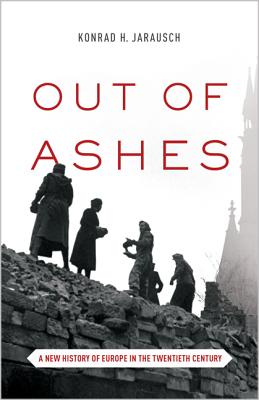

 Princeton University Press
Princeton University Press
Out of Ashes: A New History of Europe in the Twentieth Century


Key Metrics
- Konrad H Jarausch
- Princeton University Press
- Paperback
- 9780691173078
- 8.5 X 5.7 X 1.8 inches
- 2.2 pounds
- History > Europe - General
- English
 Secure Transaction
Secure TransactionBook Description
A sweeping history of twentieth-century Europe that examines its unprecedented destruction--and abiding promise
A sweeping history of twentieth-century Europe, Out of Ashes tells the story of an era of unparalleled violence and barbarity yet also of humanity, prosperity, and promise.
Konrad Jarausch describes how the European nations emerged from the nineteenth century with high hopes for continued material progress and proud of their imperial command over the globe, only to become embroiled in the bloodshed of World War I, which brought an end to their optimism and gave rise to competing democratic, communist, and fascist ideologies. He shows how the 1920s witnessed renewed hope and a flourishing of modernist art and literature, but how the decade ended in economic collapse and gave rise to a second, more devastating world war and genocide on an unprecedented scale. Jarausch further explores how Western Europe surprisingly recovered due to American help and political integration. Finally, he examines how the Cold War pushed the divided continent to the brink of nuclear annihilation, and how the unforeseen triumph of liberal capitalism came to be threatened by Islamic fundamentalism, global economic crisis, and an uncertain future.
A gripping narrative, Out of Ashes explores the paradox of the European encounter with modernity in the twentieth century, shedding new light on why it led to cataclysm, inhumanity, and self-destruction, but also social justice, democracy, and peace.
Author Bio
Konrad H. Jarausch has written or edited about forty books in modern German and European history. Starting with Hitler’s seizure of power and the First World War, his research interests have moved to the social history of German students and professions German unification in 1989/90, with historiography under the Communist GDR, the nature of the East German dictatorship, as well as the debate about historians and the Third Reich.
More recently, he has been concerned with the problem of interpreting twentieth-century German history in general, the learning processes after 1945, the issue of cultural democratization, and the relationship between Honecker and Breshnew.
Education
- MA University of Wisconsin, 1964
PhD University of Wisconsin, 1969
Source: University of North Carolina
Videos








Community reviews
Write a ReviewNo Community reviews